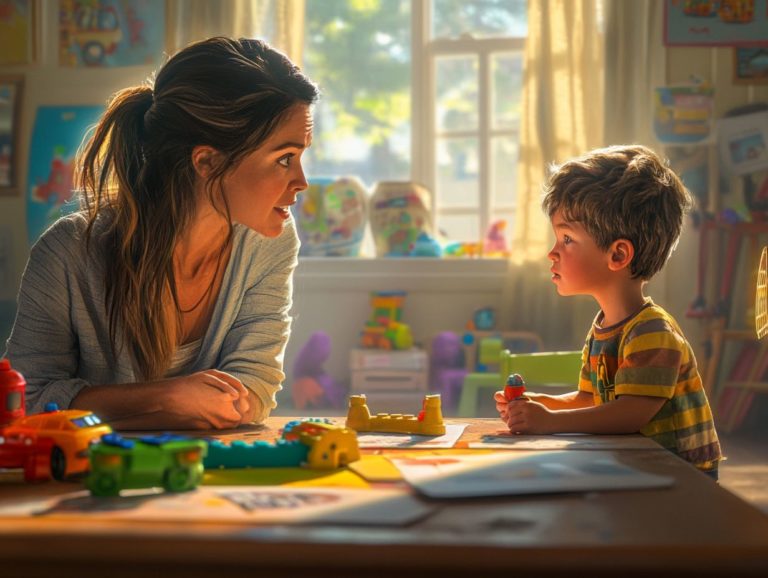5 Books on Parent-Child Connection to Read
Building a strong connection with your child, including nurturing positive adult-child relationships, is a journey that beautifully intertwines challenges and rewards.
Explore these five insightful books that empower you with valuable strategies for nurturing that bond. From grasping the intricacies of emotional development in The Whole-Brain Child to enhancing communication skills in How to Talk So Kids Will Listen, each title presents a distinct approach to effective parenting.
You ll encounter common hurdles parents often face, alongside key concepts from these books and real-life examples that will empower you to implement these practical tools in your daily interactions.
Discover exciting tools that will transform and enrich your relationship with your child today, fostering connections and psychological well-being.
Contents
- Key Takeaways:
- 1. The Whole-Brain Child by Daniel J. Siegel and Tina Payne Bryson
- 2. How to Talk So Kids Will Listen & Listen So Kids Will Talk by Adele Faber and Elaine Mazlish
- 3. The Conscious Parent by Dr. Shefali Tsabary
- 4. Hold On to Your Kids by Gordon Neufeld and Gabor Mat
- 5. Peaceful Parent, Happy Kids by Dr. Laura Markham
- How Can Parents Strengthen Their Connection with Their Children?
- What Are the Key Concepts and Strategies These Books Offer?
Key Takeaways:

- The Whole-Brain Child emphasizes the importance of connecting with your child’s emotional brain to foster better communication and understanding.
- How to Talk So Kids Will Listen & Listen So Kids Will Talk offers practical tools for effective communication, collaboration with children, and conflict resolution between parents and children.
- The Conscious Parent encourages parents to self-reflect and be present in their parenting, leading to a deeper connection with their children.
1. The Whole-Brain Child by Daniel J. Siegel and Tina Payne Bryson
In “The Whole-Brain Child,” authors Daniel J. Siegel and Tina Payne Bryson offer you a treasure trove of techniques and strategies that illuminate the intricate workings of a child’s brain. They emphasize that understanding this complexity is key to fostering strong attachments, ensuring a safe emotional environment, and building positive connections.
This understanding empowers your children to develop emotional intelligence and a genuine love for learning from a young age. By weaving together educational research on child development, this book becomes an invaluable resource for you as a parent, guiding you towards respectful communication and collaboration with your children.
It helps you navigate the challenges of parenting with confidence. The authors dive into essential concepts that underscore the importance of nurturing emotional intelligence.
They provide practical tools that enable you to cultivate self-awareness and independence in your kids, encouraging them to make thoughtful decisions and articulate their feelings effectively.
The book tackles common parenting dilemmas head-on, offering actionable strategies designed to create a nurturing environment where deep learning and collaboration can thrive. This approach not only gives you the power as a parent but also equips your children with the vital skills they need to flourish in various situations.
In doing so, it fosters resilience and a growth mindset, both of which are crucial for their long-term success.
2. How to Talk So Kids Will Listen & Listen So Kids Will Talk by Adele Faber and Elaine Mazlish
Adele Faber and Elaine Mazlish‘s ‘How to Talk So Kids Will Listen & Listen So Kids Will Talk’ is an essential resource for you as a parent, providing practical tools that elevate respectful communication and strengthen the bond between you and your children.
This guide tackles common parenting challenges and empowers your kids to articulate their feelings effectively. The book delves into actionable techniques that not only enhance your conversations but also highlight the importance of listening and validating your child’s emotions.
By actively acknowledging what your children are feeling, you can help nurture their emotional intelligence a crucial foundation for developing empathy and resilience.
The strategies offered in this guide encourage families to forge positive connections, ensuring that your children feel truly heard and understood. This nurturing approach creates a safe environment for them to express their thoughts, leading to healthier communication patterns and deeper relationships within your family unit.
3. The Conscious Parent by Dr. Shefali Tsabary
In “The Conscious Parent,” Dr. Shefali Tsabary delves into the deep connection between emotional intelligence and parenting, inviting you to reflect on your own behaviors to enhance your relationships with your children. By doing so, you can create a nurturing environment that not only gives power to your kids but also fosters their intrinsic motivation and psychological safety.
Dr. Tsabary emphasizes that your self-awareness serves as a powerful catalyst for healthy child development. When you model emotional regulation and resilience, you set a precedent for your children to follow. For example, when you mindfully process your own feelings, you re better equipped to guide your child through emotional challenges. This transforms these moments into invaluable learning experiences.
Consider incorporating strategies such as active listening, validating emotions, and engaging in shared, mindful activities to strengthen the parent-child bond. Real-life applications might include initiating family discussions about feelings during dinner or setting aside time for creative collaboration. This allows your children to express themselves freely, helping them learn in a safe and supportive environment.
4. Hold On to Your Kids by Gordon Neufeld and Gabor Mat

“Hold On to Your Kids” by Gordon Neufeld and Gabor Mat highlights the essential importance of nurturing a strong attachment between you and your children. It emphasizes psychological safety and the necessity of building relationships that empower your kids to thrive in the face of modern parenting challenges.
The authors explore practical strategies you can implement to cultivate secure attachments crucial for fostering healthy emotional development. They stress that connection serves as the cornerstone for growth, aiding your children in developing their emotional intelligence.
This emotional literacy is vital in shaping their resilience, equipping them to handle life’s trials while mitigating the risks of mental health issues such as anxiety and depression. By recognizing and nurturing these connections, you can create an amazing environment where your children feel truly understood and supported. Recognizing the importance of social-emotional learning can further enhance their psychological well-being.
5. Peaceful Parent, Happy Kids by Dr. Laura Markham
In “Peaceful Parent, Happy Kids,” Dr. Laura Markham unveils essential techniques and strategies designed to help you cultivate a harmonious family dynamic. By focusing on nurturing emotional intelligence, she paves the way for a positive environment that significantly enhances your children’s mental health and emotional well-being.
By prioritizing empathy and understanding, you are encouraged to respond to your children’s needs with patience and compassion. This approach not only equips them with crucial life skills but also gives them the power to effectively navigate their emotions.
For example, when faced with a tantrum, instead of reacting in frustration, you might choose to model calmness through deep breathing techniques. Such practices foster student autonomy in your children and cultivate intrinsic motivation as they learn to reflect on their feelings and make thoughtful choices.
This nurturing atmosphere strengthens familial bonds and encourages open communication, ultimately leading to healthier relationships and a more resilient family unit.
How Can Parents Strengthen Their Connection with Their Children?
Strengthening your connection with your children is essential. It creates a loving and supportive environment. By empowering your kids through respectful communication and collaboration, you can significantly enhance their emotional intelligence and foster lasting, positive relationships.
Active listening helps you understand your child’s thoughts and feelings. This approach cultivates trust and mutual respect. Engaging in shared activities whether it s playing games, cooking together, or exploring the great outdoors not only creates cherished memories but also imparts vital life skills.
Acknowledging feelings enables your children to express their emotions without fear of judgment. This reinforces their sense of self-worth and fosters positive connections.
These techniques enhance family bonds. They also play a crucial role in your child’s development and mental well-being, nurturing resilience and adaptability as they face life’s challenges. This approach aligns with strategies advocated by experts like Daniel J. Siegel and Dr. Laura Markham in fostering a nurturing environment.
What Are Some Common Challenges in Parent-Child Relationships?
Parent-child relationships frequently face common challenges, such as miscommunication, emotional disconnect, and differing expectations. If these issues go unaddressed, they can lead to heightened anxiety and depression for both parents and children.
Often, these difficulties arise from a lack of emotional intelligence, which is the ability to understand and manage emotions. For example, if you struggle to recognize your feelings of frustration, you might inadvertently project that negativity onto your child, resulting in a cycle of misunderstanding and resentment.
Resources like those from the Yale Center for Emotional Intelligence can provide valuable insights into enhancing emotional awareness and regulation. By acknowledging the emotional barriers that exist, you can set in motion a transformative process that fosters a healthier family dynamic and encourages open dialogue.
By focusing on the underlying emotions at play, families can develop strategies that enhance communication and empathy, ultimately paving the way for stronger, more nurturing and positive connections.
How Can Reading These Books Help Parents Improve Their Relationships with Their Children?

Reading parenting books like “The Whole-Brain Child” and “Peaceful Parent, Happy Kids” equips you with practical tools and strategies that enhance your emotional intelligence, ultimately leading to more fulfilling adult-child relationships with your children.
These transformative reads explore the intricacies of child development and emphasize the importance of nurturing your child’s emotional and psychological well-being. By integrating techniques such as mindful communication and empathetic listening into your daily interactions, you can create an environment that encourages open dialogue, respectful communication, and trust.
As you apply these strategies, you may notice a significant shift in your family dynamics. Your children will feel valued and understood, leading to improved cooperation and a reduction in conflicts. This understanding boosts your child’s emotional resilience and creates a happier home.
These strategies also help address parenting challenges and foster psychological safety within the family. Pick up these books today! Transform your parenting and build a stronger bond with your kids.
What Are the Key Concepts and Strategies These Books Offer?
The key concepts and strategies found in parenting books offer you a wealth of techniques and strategies designed to build strong relationships, enhance emotional intelligence, and tackle parenting challenges through practical, evidence-based methods.
You ll often encounter an emphasis on open communication, encouraging you to cultivate an environment where your children feel safe expressing their thoughts and feelings without the fear of judgment. Active listening is frequently recommended; this practice not only validates your child’s emotions but also strengthens the bond of mutual respect and understanding between you, fostering deep learning and emotional processing.
The significance of consistent routines and boundaries is underscored, as these elements give your children a sense of security and predictability in their lives. In real-life scenarios, applying these strategies can be as straightforward as dedicating quality time each day for meaningful conversations or engaging in collaborative problem-solving during conflicts, thus empowering kids with a sense of student autonomy.
These actions nurture a strong parent-child attachment and contribute positively to their mental health, enhancing resilience and emotional well-being for both you and your children.
What Are Some Real-Life Examples of These Strategies in Action?
Real-life examples of implementing strategies from parenting books demonstrate how practical tools can cultivate strong attachments and enhance collaboration with children, ultimately leading to improved emotional intelligence and healthier family dynamics.
For instance, one mother embarked on a journey using collaborative problem-solving techniques with her spirited toddler. By openly discussing challenges like bedtime resistance, she discovered that involving her child in the decision-making process not only made evenings more manageable but also allowed her little one to express their feelings. This approach resulted in a remarkable bond, where the child felt heard and valued, fostering intrinsic motivation.
Many parents have reported that by incorporating mindfulness practices from parenting literature, they have noticed a shift in their ability to manage everyday stresses, creating a more harmonious household environment. These experiences illustrate how effectively these strategies can transform relationships, fostering resilience in both parents and children while navigating common parenting hurdles, including anxiety and depression.
How Can Parents Apply These Lessons in Their Daily Interactions with Their Children?
You can effortlessly weave the wisdom from esteemed parenting books into your daily interactions by adopting techniques that promote emotional intelligence and nurture connections. This approach will not only enhance your child’s love of learning but also contribute to their psychological well-being and support social-emotional learning.
Start by initiating open conversations around the dinner table. Encourage your children to share their feelings and thoughts about their day. This fun practice helps kids express their feelings openly while deepening family bonds and promoting respectful communication.
Setting aside regular family game nights or reading sessions creates a consistent routine that highlights the joy of learning. Consistency in these activities fosters familiarity and trust, allowing your children to feel secure in expressing their emotions and enhances strong attachment.
By recognizing and celebrating small achievements together, you reinforce positive behaviors, paving the way for lasting and meaningful relationships that support your child’s growth and empower kids to take charge of their learning and development.
Frequently Asked Questions

Recommended Books on Parent-Child Connection
- The Whole-Brain Child: 12 Revolutionary Strategies to Nurture Your Child’s Developing Mind by Daniel J. Siegel and Tina Payne Bryson (Yale Center for Emotional Intelligence)
- Parenting from the Inside Out: How a Deeper Self-Understanding Can Help You Raise Children Who Thrive by Daniel J. Siegel and Mary Hartzell
- No-Drama Discipline: The Whole-Brain Way to Calm the Chaos and Nurture Your Child’s Developing Mind by Daniel J. Siegel and Tina Payne Bryson (Yale Center for Emotional Intelligence)
- The Power of Showing Up: How Parental Presence Shapes Who Our Kids Become and How Their Brains Get Wired by Daniel J. Siegel and Tina Payne Bryson
- Hold On to Your Kids: Why Parents Need to Matter More Than Peers by Gordon Neufeld and Gabor Mat
- The Self-Driven Child: The Science and Sense of Giving Your Kids More Control Over Their Lives by William Stixrud and Ned Johnson
- Punished by Rewards: The Trouble with Gold Stars, Incentive Plans, A’s, Praise, and Other Bribes by Alfie Kohn
- Raising Human Beings: Creating a Collaborative Partnership with Your Child by Ross W. Greene
- Crying in H Mart: A Memoir by Michelle Zauner
- I’m Glad My Mom Died by Jennette McCurdy
- Little Fires Everywhere by Celeste Ng
- Peaceful Parent, Happy Kids by Dr. Laura Markham
- Three Little Words: A Memoir by Ashley Rhodes-Courter
- Before We Were Yours: A Novel by Lisa Wingate
- Raising Good Humans: A Mindful Guide to Breaking the Cycle of Reactive Parenting and Raising Kind, Confident Kids by Hunter Clarke-Fields
- Courage to Grow: How Acton Academy Turns Learning Upside Down by Laura Sandefer
- Schools on Trial: How Freedom and Creativity Can Fix Our Educational Malpractice by Nikhil Goyal
- The Gift of Failure: How the Best Parents Learn to Let Go So Their Children Can Succeed by Jessica Lahey
- Dumbing Us Down: The Hidden Curriculum of Compulsory Schooling by John Taylor Gatto
- Free to Learn: Why Unleashing the Instinct to Play Will Make Our Children Happier, More Self-Reliant, and Better Students for Life by Peter Gray
How can these books help improve the parent-child connection?
These books offer practical strategies and insights from experts in child development and psychology. They guide you on how to communicate effectively, understand your child’s needs, and foster a strong bond, promoting both emotional intelligence and mental health.
Are these books suitable for parents of children of all ages?
Absolutely! These books cover a wide range of ages and stages, from infancy to adolescence. They provide valuable insights and advice for parents at any stage of their child’s development, including the youth population.
Do these books focus on a specific type of parent-child relationship?
No, these books apply to all types of parent-child relationships, regardless of the current dynamic or challenges. They offer practical tools and techniques for improving and strengthening any connection, addressing various parenting challenges.
Are these books based on scientific research?
Yes, these books are written by renowned experts in child development and psychology. They draw on extensive research and studies to support their insights and recommendations, including educational research.
Can these books be read by both parents and caregivers?
Absolutely! These books are a treasure trove for anyone involved in a child’s life, whether a parent, grandparent, teacher, or caregiver. They offer valuable insights and techniques for fostering a strong connection with a child and strategies to address Borderline Personality Disorder and other psychological conditions.






